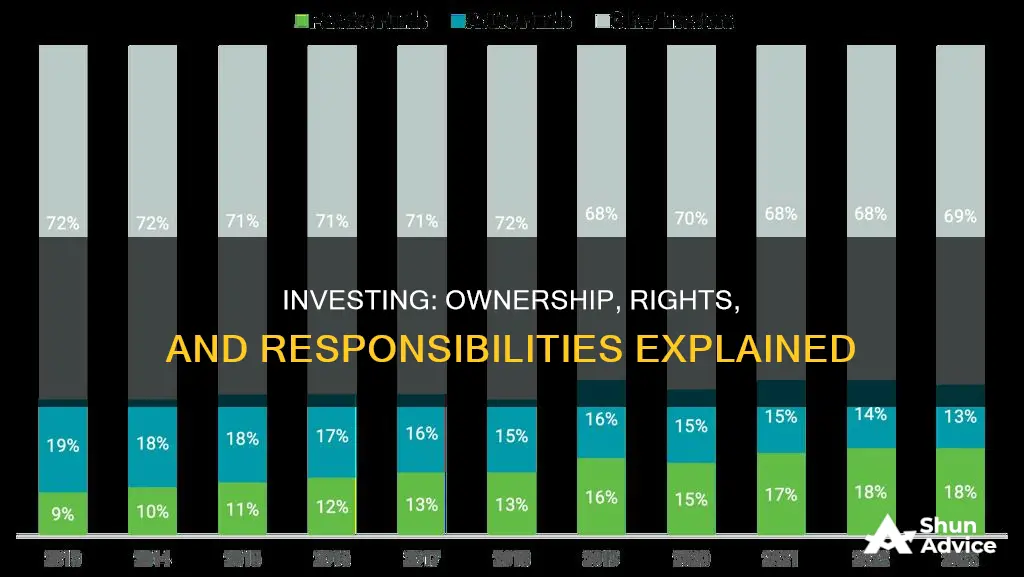
Investing is the act of allocating resources, usually money, into a venture that is expected to generate income or profit. There are three basic categories of investment: ownership, lending, and cash equivalents. Ownership investments are the most volatile and profitable class of investment. When you buy stock, you own a small piece of that particular company. This may be a minuscule stake, but it's still ownership. The money put into starting and running a business is an investment. Owners typically make investments or contributions to their companies in two different ways: cash or other assets.
What You'll Learn

Shareholders have voting rights
Shareholders typically have the right to vote in person at the corporation's annual general meeting or by proxy if they are unable to attend. Proxy votes can be cast by mail, phone, or online and must usually be submitted before a set cutoff time, typically 24 hours before the shareholder meeting.
The number of votes a shareholder has corresponds to the number of shares they own. Therefore, someone who owns more than 50% of a company's shares has a majority vote and is considered to have a controlling interest in the company. This allows them to direct many of the decisions made by the company.
It's important to note that shareholders do not have voting rights on basic day-to-day operational or management issues. Additionally, preferred shareholders typically do not have any voting rights, while common shareholders usually have one vote per share.
Shareholders also have the responsibility to ensure their investment performs well. This involves educating themselves about the company and its financial performance to make informed decisions when voting on corporate matters.
Exploring Vietnam: Investment Opportunities for Indian Investors
You may want to see also

Dividends are distributed to shareholders
Investing in stocks means buying a percentage of ownership in a company. Owners of a company's stock are known as shareholders. Shareholders can participate in the company's growth and success through appreciation in the stock price and regular dividends paid out of the company's profits. Dividends are the percentage of a company's earnings that are paid to its shareholders as their share of the profits. Dividends are distributed to shareholders in proportion to their shareholding and are usually paid quarterly, with the amount decided by the board of directors based on the company's most recent earnings.
Dividends may be paid in cash or additional shares. When a company announces a dividend, it also announces the payment date on which the dividend will be deposited into the shareholders' accounts. The dividend yield of a stock is the dividend amount paid per share, expressed as a percentage of the company's share price. For example, if a company's board of directors decides to issue an annual 5% dividend per share, and the company's shares are worth $100, the dividend is $5. If the dividends are issued every quarter, each distribution is $1.25.
Not all companies pay dividends to the owners of common shares. Owners of preferred shares are guaranteed a set dividend payment. Larger, established companies with predictable profits are often the best dividend payers. Companies in the healthcare and pharmaceuticals sectors, for instance, maintain a regular record of dividend payments. On the other hand, young, fast-growing companies in sectors like technology and biotechnology may not pay regular dividends since they are in the early stages of development and retain their earnings for research, business expansion, and operational activities.
Dividends are an important indicator for investors as they signal that a company has stable cash flow and is generating profits. A steady track record of paying dividends also makes stocks more attractive to investors. Dividends provide shareholders with recurring income and can raise morale among investors. However, dividends are not guaranteed and companies may cancel or declare unscheduled dividends at any time.
Alternative Investments: When to Diversify Your Portfolio
You may want to see also

Owners invest cash or other assets
Investing involves deploying capital (money) toward projects or activities with the expectation of generating a positive return over time. Owners invest cash or other assets into a business, and this can be done in several ways.
If an owner is starting a sole proprietorship, they can put money into the business by debiting cash and crediting the owner's capital. They can also lend money to the business by debiting cash and crediting a liability account such as notes payable. If the owner is investing an asset other than cash, the business will record the cash equivalent or fair market value of the asset.
If an owner is forming a regular corporation, they can invest cash in exchange for shares of the new corporation's common stock. This involves debiting cash and crediting the common stock account. If the owner lends cash to the corporation, cash is debited, and the liability account "notes payable to the stockholder" is credited. Again, if the owner invests an asset other than cash, the corporation will record the cash equivalent or fair market value of the asset.
Owners can also invest in stocks, bonds, mutual funds, exchange-traded funds (ETFs), trusts, alternative investments, options and other derivatives, commodities, and more.
It's important to note that investing in a company typically gives owners a percentage of ownership in the company, but the level of ownership may not provide the benefits and responsibilities sought. Most shareholders have no direct control over a company's operations, although some have voting rights that give them some authority, such as voting for board members.
Buffett's India Investment: Has He Taken the Plunge?
You may want to see also

Owners have a responsibility to ensure their investment performs well
Investing in a company means buying a percentage of ownership in the company. The average shareholder is typically not involved in the day-to-day operations of a company. However, they have a responsibility to ensure their investment performs well.
Owners have both a right and a responsibility to ensure their investment performs well. If the family's aspiration is to perpetuate the family business across generations, owners need to ensure that the business will not only survive but thrive. Neglecting to discuss owners' expectations can lead to disagreements and sub-optimal performance. Owners who do not see clear financial benefits to their ownership may opt out over time. Discussing expectations can help family members unite around shared goals and prepare them to deal with difficult questions that may arise.
Owners can ensure their investment performs well by educating themselves about the business and staying informed about company news and records. They can also participate in activities available to educate shareholders, such as meetings, calls, and conferences. Owners can also elect directors, set policies, and plan for orderly ownership succession. Additionally, they can provide input on issues at the intersection of family and business, such as family employment, financial expectations, and codes of conduct.
To ensure their investment performs well, owners can also hold management accountable by receiving accurate, timely, and transparent reporting on business performance. They can also work with management to understand what is feasible to expect from the business, given its industry and competitive position. Owners can also encourage management to share its strategic plan and long-term outlook for the business.
Streamline Your Parking: Invest in Smart Management Solutions
You may want to see also

Owners have a right to accurate, timely and transparent reporting on business performance
Investing in a company means buying a percentage of ownership in that company. The level of ownership varies, and investors may own a small or large percentage of the company. Regardless of the level of ownership, investors have a right to accurate, timely, and transparent reporting on business performance.
Accurate and timely financial reporting is essential for any business. It provides valuable insights that enable companies to make informed decisions about their income and expenditure. Financial reporting also helps businesses grow, expand, and innovate by presenting accurate data on current financial status, forecasts, and trend analysis.
For investors, financial reporting is crucial as it provides a clear picture of a company's profitability, cash flow, and debt obligations. It helps investors make informed decisions about their investments and assess the financial health and performance of a company. Regular reviews of financial statements demonstrate a commitment to transparency and can attract more investors, fueling business growth.
Additionally, financial reporting helps protect investors and other stakeholders from fraud and abuse while ensuring compliance with government regulations and industry standards. It also aids in identifying potential liabilities and managing debt effectively.
To ensure a productive dialogue on financial performance, it is essential to acknowledge the history of financial discussions within the group and encourage fact-based conversations grounded in data and analysis. By providing accurate, timely, and transparent reporting on business performance, companies can maintain trust and confidence among their investors and stakeholders.
Investing in India: Your Guide to Getting Rich
You may want to see also
Frequently asked questions
When you invest in a company, you own a small piece of that company. This could be through buying stock, which means buying a percentage of ownership in the company. The amount of ownership may vary, and it does not always come with benefits and responsibilities.
One benefit of being an owner through investing is receiving dividends. Dividends are distributions of a company's profits shared with shareholders. Dividends are not guaranteed, and newer companies typically reinvest profits instead of paying dividends. Another benefit is gaining voting rights, which allows you to have a say in company decisions.
There are three basic categories of investment: ownership, lending, and cash equivalents. Ownership investments include stocks, real estate, and precious metals. Lending investments involve lending money, such as through bonds or savings accounts, and earning interest over time. Cash equivalents include money market accounts, which offer easy liquidation and modest interest rates.
Investing differs from speculation in terms of timeframe, return expectations, and source of returns. Investors typically have a longer-term horizon, expecting profits to accumulate over months or years. Speculators seek short-term gains from price fluctuations. Investors may receive income through dividends or interest, while speculators rely solely on price fluctuations for returns.







